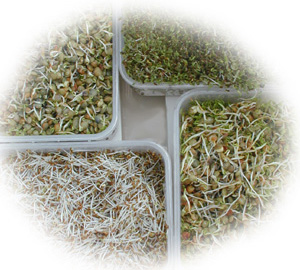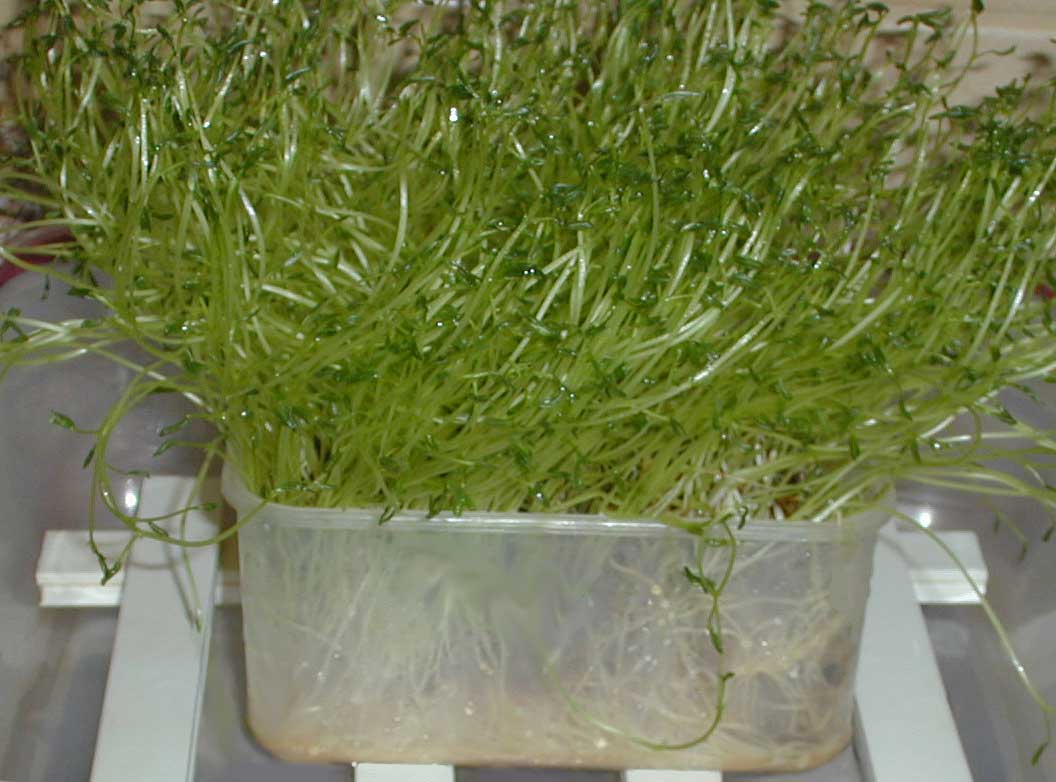Sprouted grains

Concentrated vitamins for your health
Sprouted grains

Concentrated vitamins for your health
Sprouted grains are an essential source of vitamins and minerals.
To get all the vitamins you need and to discover how sprouted grain can improve you health, we recommend that you make sprouted grains a regular part of your diet.
Some sprouted grain, such as soy sprouts, can be found in your supermarket or in your health food store.
But it's very easy to make grains germinate in your own kitchen. That way you can have right at home a permanent supply of fresh sprouted grain which you can eat whenever they are just right.
Many grains can be prepared at home for your own table: soya, lentils, rice, alfalfa, lucerne, quinoa, oats, barley, etc.
At room temperature (about 20°C or 70F) you should allow about four days on the average from the beginning of germination until the sprouts are ready to be eaten, but you can eat them as early as the second day or as late as the eighth day, depending on the temperature and how you water them.
To make your grains germinate successfully, you have only to buy grain of good quality in your health food store. Be sure to buy whole seeds which have not been chemically treated or heated. You must water them regularly, at least twice a day with non-chlorinated water of good quality.
About the second day, the germ and the stem appear, indicating that germination has begun. At this time, the vitamin content is very high, especially the vitamin C, because the grain is producing lots of vitamins which it needs for its own growth.
The stem grows from day to day - you can almost see it grow before your eyes.
The speed of growth depends on the temperature and you can thus adjust the rate of growth.
You need only raise the temperature a few degrees, say from 18 to 22°C, to speed up the growth; and on the other hand you can slow it by lowering the temperature a few degrees. You can keep sprouted grains for a good while by putting them in a cool place like the vegetable basket of your refrigerator.
Each grain supplies nutritional elements in different proportions, and it is advisable to vary the grains you eat to the extent possible.
In the books "Stress Control" and "Raw food nutrition", you may find advice on how to make grains germinate, on why to eat them and on how to prepare them for your table.
Click here for more information about these books.
Chlorinated water is not good for germinating grain. Don't use tap water - it's usually chlorinated.
To germinate your grains under the best of conditions, we advise you to use bottled non-chlorinated spring water. Alternatively, you might wish to install a water filter system in your own kitchen to provide a supply of pure non-chlorinated water at your own tap for drinking as well as for the preparation of delicious sprouted grains.
Sprouted grains may be eaten plain or in salad, together with other raw vegetables or in dishes you prepare according to your own recipes.
Bon appétit !

A high vitamin and chlorophyl
content :
lentils after 7 days of germination
© Copyright TNR TECHNOLOGY - All rights reserved.